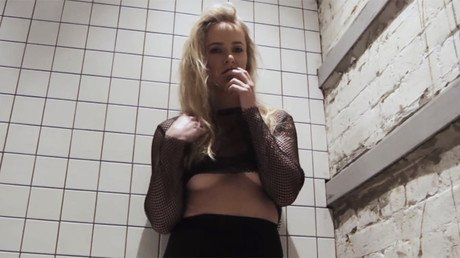Assange critics and ‘journalists’ having field day on Twitter after whistleblower’s arrest
Mainstream media journalists and critics of whistleblower Julian Assange have been gloating and joking on Twitter since his arrest at the Ecuadorian Embassy in London on Thursday, proving love of free speech can be very selective.
Political correspondent for the UK Independent newspaper Ashley Cowburn was one of the first in with a jab, tweeting an image of Assange when he first entered the Ecuadorian Embassy alongside one taken during his arrest, with the comment “political journalists pre and post-Brexit.”
Perhaps wisely, Cowburn later deleted the tweet which UK media watchdog Media Lens called “brutal.”
Looks like Ashley Cowburn, political correspondent at the Independent, deleted his brutal tweet on Assange. We thought that might happen... pic.twitter.com/A5vg3lJ1Iz
— Media Lens (@medialens) April 11, 2019
The Guardian’s chief political correspondent also felt it was time for a Brexit joke, tweeting that since Assange’s internet access had been cut off last March, “he probably thinks we’ve left the EU.”
Apparently Julian Assange‘s internet access has been cut off since March so he probably thinks we’ve left the EU https://t.co/DewDfkvJIW
— Jessica Elgot (@jessicaelgot) April 11, 2019
Head of ‘investigative journalism’ website Bellingcat, Eliot Higgins, made light of Assange’s arrest too, tweeting that the cleaners in the embassy would be happy to “get their broom cupboard back.”
The Ecuadorian Embassy's cleaners breath a sigh of relief as they get their broom cupboard back.
— Eliot Higgins (@EliotHiggins) April 11, 2019
Former BBC Newsnight and Financial Times journalist Chris Cook also had a moment to be proud of on Twitter when he compared Assange, whose health has been ravaged after nearly seven years stuck inside the embassy without proper medical care, to a character from British comedy show ‘Only Fools and Horses.’
Imagine a journalist tweeting this about a whistleblower who had leaked details of Russian or Chinese war crimes, rather than US/Western ones. https://t.co/fKMBjfDmUI
— Hicham Yezza (@HichamYezza) April 11, 2019
Politicos got in on the action too, with Neera Tanden, head of so-called liberal think tank, the Center for American Progress, tweeting that Assange supporters, or “cultists” as she put it, were defending an “agent of a proto fascist state.” Tanden’s tweet was in reference to the highly original conspiracy theory that Assange has been working for the Russian government.
There are many cultists on this site, but the Assange cultists are the worst. Assange was the agent of a proto fascist state, Russia, to undermine democracy. That is fascist behavior. Anyone on the left should abhor what he did. Not celebrate it.
— Neera Tanden (@neeratanden) April 11, 2019
In line with that conspiracy, well-known Twitter screecher Louise Mensch, who was for a while enthusiastically embraced by mainstream media, tweeted that watching Russian media cover the event of Assange’s arrest was “glorious.”
There’s something glorious about Russian state TV Ruptly being forced to cover Julian Assange bein dragged, visibly resisting arrest, from the Ecuadorean Embassy https://t.co/kYgvsuKXZM
— Louise Mensch (@LouiseMensch) April 11, 2019
Some media folk had slightly more moderate reactions, saying it was possible to not like Assange, but to also acknowledge that prosecuting him would be “extremely dangerous and troubling” and have “incredibly worrying implications” for free speech and journalism.
Assange sucks but prosecuting publishers seems extremely dangerous and troubling to me.
— Matthew Yglesias (@mattyglesias) April 11, 2019
Just sayin’ it’s possible to think that Julian Assange is a definite creep, a probable rapist, a conspiracist whackjob *and* that his arrest has incredibly worrying implications for the treatment of those who blow the whistle on gross abuses of state power.
— Ash Sarkar (@AyoCaesar) April 11, 2019
The generally gleeful reactions were noticed by journalist Glenn Greenwald, who wrote on Twitter that those celebrating Assange’s arrest were showing themselves to be “allies” of the most “most extremist elements of the Trump administration” who are trying to “criminalize” reporting on classified documents and exposure of war crimes.
If you're cheering Assange's arrest based on a US extradition request, your allies in your celebration are the most extremist elements of the Trump administration, whose primary and explicit goal is to criminalize reporting on classified docs & punish WL for exposing war crimes.
— Glenn Greenwald (@ggreenwald) April 11, 2019
The security state agents for NBC/MSNBC cheering the Trump administration for arresting Assange because they're authoritarians who only pretend to care about press freedom when it advances their partisan interests.This is what happens when news outlets merge with the US Govt pic.twitter.com/wFBAiwb3GQ
— Glenn Greenwald (@ggreenwald) April 11, 2019
Journalist Mark Ames commented that establishment media had built up and profited off WikiLeaks, but then "turned on Assange with shameless hive mind efficiency."
The way Establishment media culture built up the cult of WikiLeaks, profited off WikiLeaks, then savagely turned on Assange with shameless hive mind efficiency—is something frightening, like a real-life "irrational mob mentality" in action pic.twitter.com/wEnJA1zKz8
— Mark Ames (@MarkAmesExiled) April 11, 2019
In a much-needed injection of reality, fellow whistleblower Edward Snowden reminded journalists covering the arrest that United Nations experts have repeatedly urged the UK to honor its human rights obligations and let Assange leave the embassy freely — something which hasn’t seemed to concern British journalists covering the case.
Important background for journalists covering the arrest of Julian #Assange by Ecuador: the United Nations formally ruled his detention to be arbitrary, a violation of human rights. They have repeatedly issued statements calling for him to walk free--including very recently. pic.twitter.com/fr12rYdWUF
— Edward Snowden (@Snowden) April 11, 2019
US journalist Michael Tracey also noted that Trump supporters who claimed to be fans of WikiLeaks while it was releasing documents related to Hillary Clinton’s campaign for president would be revealed as “outright frauds” if they supported his arrest.
We will know Trump supporters who claimed for three years to be huge fans of WikiLeaks are outright frauds if they don't impose major pressure on the Administration to not unjustly prosecute Assange
— Michael Tracey (@mtracey) April 11, 2019
Intercept reporter Ryan Grim said Assange’s arrest would be a “real test” for the media and wondered if they could “separate their personals feelings” toward him “from the question of whether it is okay to prosecute a publisher for publishing?”
So far, it looks like they’re failing miserably.
This is a real test for the American media. Can they separate their personals feelings toward Assange from the question of whether it is okay to prosecute a publisher for publishing? Matt is right, this is extremely dangerous https://t.co/3O5P2W7MZR
— Ryan Grim (@ryangrim) April 11, 2019
Like this story? Share it with a friend!














